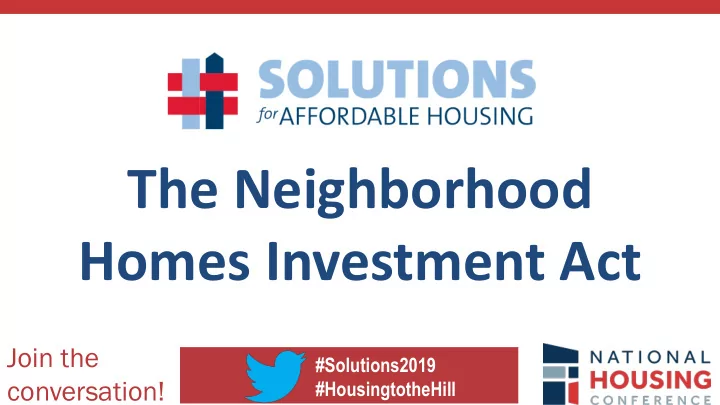

The Neighborhood Homes Investment Act Join the #Solutions2019 conversation! #HousingtotheHill
Neighborhood Homes Investment Act REINVEST | REPOPULATE | REVITALIZE December 3, 2019
What problem are we trying to solve? 101 million of the 135 million housing units in the US are in buildings with less than 4 units. 40% of our housing stock is at least 50 years old. Vacancies persist in many market even as foreclosures decline – there were 3.7 million vacant properties in 2005, but 5.8 million in 2016. In many communities it costs more to rehab a house than it can be sold for.
Before
After
Neighborhood Homes Coalition Center for Community Progress National Association of Real Estate Brokers Enterprise Community Partners National Association of State and Local Equity Funds Habitat for Humanity National Association of the Remodeling Industry Housing Assistance Council National Community Stabilization Trust Housing Partnership Network National Council of State Housing Agencies Local Initiatives Support Corporation National Fair Housing Alliance Mortgage Bankers Association National Housing Conference National Alliance of Community Economic National Neighborworks Association Development Associations National Association of Affordable Housing Lenders Prosperity Now National Association of Hispanic Real Estate Quicken Loans Professionals National Association of Realtors Up for Growth Action
What Are We Proposing? The Neighborhood Homes Investment Act (NHIA) A new federal tax credit to attract capital to build and rehabilitate 500,000 owner-occupied homes in distressed urban, suburban and rural neighborhoods over the next decade No other federal tax incentive addresses a key problem: development costs exceed market values for owner-occupied homes in distressed neighborhoods. NHIA complements but does not duplicate: Tax-exempt mortgage bonds: reduce monthly payments, not development cost gaps Low Income Housing Tax Credits: for rentals, not homeownership New Markets Tax Credits and Opportunity Zones: for commercial real estate and businesses, not homeownership
Source of NHIA Tax Credits State HFAs given NHIA credits based on a formula $3 per capita annually Minimum for small states: $4 million annually Nationwide total: ~$3 billion annually States may also elect to convert Private Activity Bond capacity to get additional NHIA tax credits Each $1 of PAB authority converts to $0.60 in NHIA tax credits For 2019, states carried forward $51billion in unused PABs
How Would NHIA Work? States write allocation plans States make allocations to NHIA managers Could include developers, investors, lenders NHIA managers use allocation to raise equity capital from investors to build/rehab homes Investors can claim credits once the home is occupied by an eligible homeowner
Eligible Neighborhoods Eligible census tracts must meet these three criteria: Poverty rate at least 130% of area poverty rate Median family income less than 80% of area median income Median home value less than 100% of area median home value Covers 22% of census tracts nationwide; 24% of non-metro tracts Up to 20% of allocations may be provided to certain additional rural communities and/or to gentrifying census tracts for owner occupied rehab States may develop additional criteria
Example: Baltimore, Maryland
Example: State of Georgia
Eligible Home Types Home Types Single-family homes with 1-4 units Condominium units Cooperative housing Development Types New construction for sale Substantial rehab for sale Substantial rehab for existing homeowners
Eligible Homeowners and Home Prices Homeowners with incomes up to 140 percent of the area median family income (MFI) Maximum home price cannot exceed 4 times the area MFI Example: MFI = $75,000 Maximum homeowner income = $105,000 Maximum home price = $300,000 Source: 2018 HUDUser Database
NHIA Tax Credit Amount For home sales, the tax credit covers the difference between the sales price and the total qualified development costs For rehabilitation of owner-occupied homes, the tax credit covers the difference between the total qualified development costs and the amount received by the project sponsor as payment for rehabilitation The tax credit is capped at 35% of the lesser of: total development costs (acquisition, rehab, demo, and construction); or 80% of national median sales price for new homes ($261,120 in 2018). Eligible building acquisition costs limited to 75% of rehab costs $20,000 minimum rehab per unit
Claiming the NHIA Tax Credit NHIA credits are claimed when a home is completed, inspected, and occupied by an eligible owner Investors are not subject to recapture If the home resells within five years, the homeowner must pay a declining percentage of the gain to the state for re- use in neighborhood revitalization (50% in year 1 … 10% in year 5)
Protecting Against Gentrification Eligible neighborhoods have median home values below the area median Eligible homeowner income is limited to 140% of the area median Home sales prices are limited to 4X area median income Eligible basis for tax credits is limited to 80% of the national median new home price
NHIA Financing Example: New Construction Land Acquisition $ 40,000 Construction Costs 200,000 Total Development Cost $240,000 Less: Sales Price (190,000) Gap $ 50,000 Maximum NHIA Tax Credit (35% of $ 84,000 $240,000) NHIA Tax Credit Allowed $ 50,000
NHIA Financing Example: Rehabilitation Land/building acquisition $ 35,000 Rehabilitation 85,000 Total Development Cost $130,000 Less: Sales Price (100,000) Gap $ 30,000 Maximum NHIA Tax Credit (35% of $45,500 $130,000) NHIA Tax Credit Allowed $30,000
NHIA Outcomes 500,000 homes built or rehabilitated $100 billion of total development activity 785,714 jobs in the construction and related industries $42.9 billion in wages and salaries $29.3 billion in federal, state and local tax revenues and fees Reduction of blight and vacant properties Homeownership opportunities and asset-building for wide range of households
Contact Us For more information about the NHIA proposal and coalition advocacy efforts, please visit our website: www.neighborhoodhomesinvestmentact.org Contact us at: info @neighborhoodhomesinvestmentact.org
Q&A Join the #Solutions2019 conversation! #HousingtotheHill
Recommend
More recommend